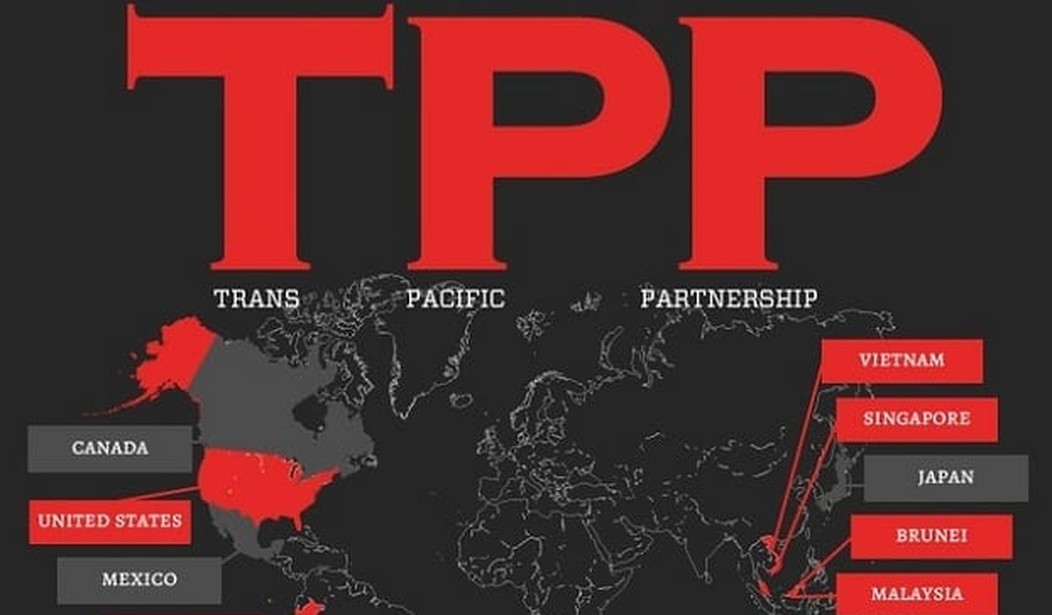Yesterday, Barack Obama was handed a sound repudiation by his own party. When votes were cast for cloture on the bill giving Obama “fast track” trade negotiation agreement only one Democrat senator voted to give him that authority:
President Obama collided with his own party Tuesday when Senate Democrats stalled consideration of a trade measure that would give the administration greater authority to negotiate more freely with other countries.
The Senate vote was a sharp blow to the president’s efforts to win approval for a new Asia-Pacific trade bill that has emerged as a top agenda item for Obama. Only one Democratic senator, Thomas R. Carper of Delaware, voted with the president Tuesday.
In general, I have no problem with free trade agreements so long as they are actually that. Free trade helps all sides. Protectionism is simply war waged on the poor and the middle class who are forced to buy goods and services at higher prices and it discourages innovation and efficiency in US firms. Likewise, I have no problem with “fast track” trade negotiation authority. This is a logical way to conduct trade negotiations and it prevents opposition to free trade agreements, typically unions and enviro-nazis, from waging war against specific articles in an agreement rather than the entire agreement as a way of killing the agreement altogether.
While I think the Democrats are voting against the agreement for profoundly stupid reasons, I think a negative vote is the thing to do.
The negotiations for the agreement have been carried out in secret. I have no issue with secret negotiations but I have a huge issue with keeping the results of those negotiations secret. Usually we classify information to keep it out of the hands of foreign governments. In this case, foreign governments have the information and it is being classified to keep it out of the hands of Congress and the American people:
Democrats and some Republican critics have been particularly frustrated by Obama’s decision to treat the TPP documents as classified information, which prevents them from responding to Obama’s claims about the pact in detail.
“Your Administration has deemed the draft text of the agreement classified and kept it hidden from public view, thereby making it a secret deal,” the letter reads. “It is currently illegal for the press, experts, advocates, or the general public to review the text of this agreement. And while you noted that Members of Congress may ‘walk over … and read the text of the agreement’ — as we have done — you neglected to mention that we are prohibited by law from discussing the specifics of that text in public.”
That’s right. Senators, Congressmen, and selected staff can read the agreement in a secure room. If they take notes, the notes must be surrendered before they leave the room. They have to sign non-disclosure agreements promising not to discuss the agreement with others. Then they are supposed to vote on it.
Can you, an American citizen, find out what is in the deal?
The details of the Obama administration’s proposals for a massive 12-nation trade zone in the Asia-Pacific region are off limits to most Americans, held close by negotiators who worry that too much openness would make it impossible to reach a deal.
But a chosen few have been allowed to peek behind the curtain and share some of the most sensitive documents.
Who are they?
…
In what has been criticized as an industry-dominated advisory system, those executives are among more than 500 people who are allowed to read and comment on the negotiating proposals that the United States presents to its trading partners. They can look at the material on a secure Web site, comment on trade policy proposals in regular meetings, and request one-on-one sessions with negotiators — favored access that gives them a direct pipeline into the talks.
The access isn’t exclusive to industry. The heads of the United Steelworkers, Teamsters, United Auto Workers and the United Food and Commercial Workers unions sit with top corporate executives on the same presidentially appointed trade panel — the top “tier” of a an advisory system that includes around two-dozen committees.
Diverse small industries, including local farm bureaus and the International Association of Skateboarding Companies, have also been represented. And membership comes with limits, including security clearances and a non-disclosure agreement that carries criminal penalties for violators.
Some, like Larry Kudlow, have argued that voting for this agreement is conservative thing to do. But even Kudlow slips this deal-breaker into the argument:
Republicans have a natural suspicion of what kind of trade agreement Barack Obama will deliver. He’s proven himself to be anything but a shrewd negotiator when it comes to foreign affairs — think Cuba. And others worry that he could abuse his executive authority, as he’s done on immigration, the IRS and the health care law. But any bad deal that Obama negotiates can and should be voted down by Congress on final ratification. Republicans have large majorities in both houses of Congress that serve as a backstop to prevent a bad bill. But without TPA the process stalls out altogether.
If you want a better example of Obama’s inability to negotiate, even from a position of strength, think about the Iraq SOFA. Hell, think about the Iran nuclear talks.
Passing a large scale trade agreement in secret is not only bad policy it is anti-democratic. If Obama want’s to keep secret what other nations have agreed to, I don’t have a problem with that. I understand that some of them may have made hard political decisions. What is not permissible is that he keep secret what the United States has agreed to do.
On the point of excessive secrecy alone this bill should be opposed and, in this case, we owe a debt of gratitude to the Democrat caucus for doing what needed to be done.














Join the conversation as a VIP Member